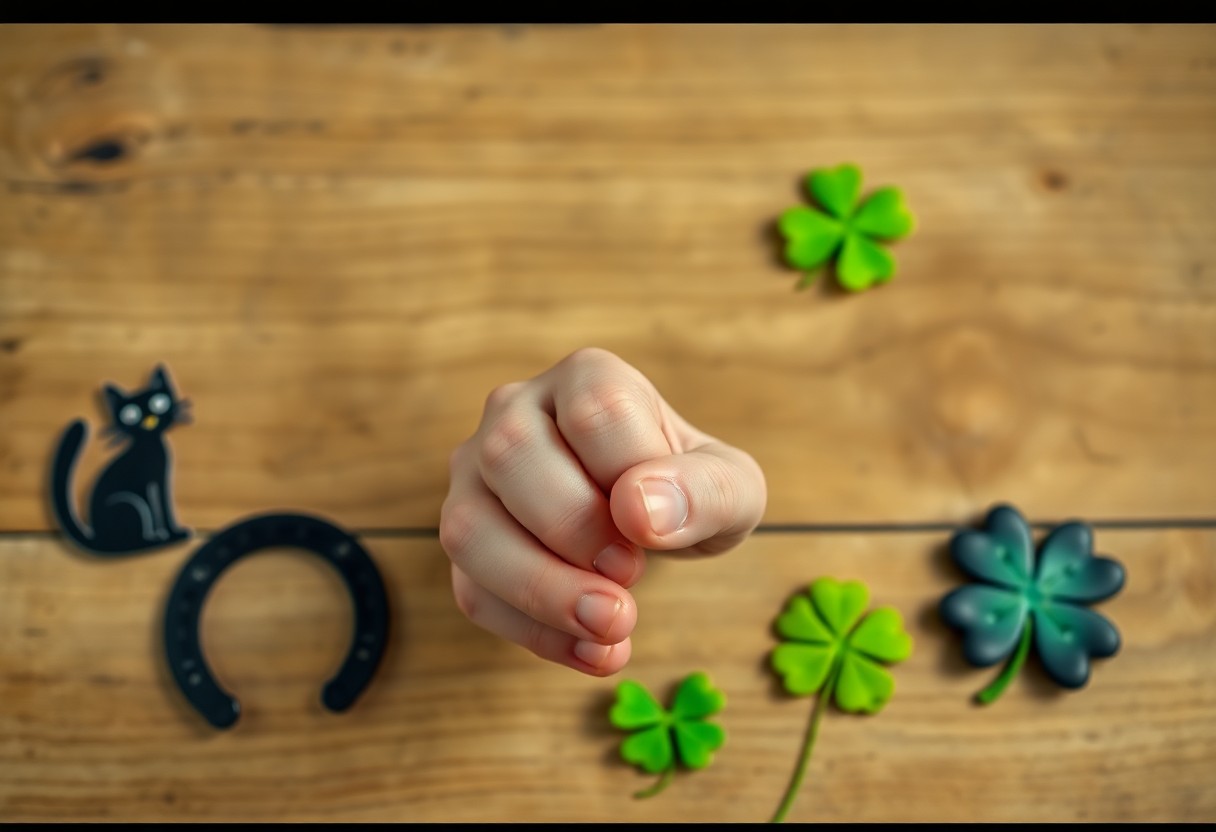Humour often takes on a life of its own when it comes to superstitions, and knocking on wood is a prime example of this whimsical tradition. Have you ever wondered why you, along with many others, instinctively tap on wood after expressing a hopeful thought? Throughout this post, we will investigate into the intriguing origins and meanings behind this peculiar habit, exploring how it has become a common practice in many cultures to ward off misfortune and invite good luck.
The Origins of Superstitions
Your understanding of superstitions can greatly enrich your perspective on cultural practices. These beliefs often stem from ancient traditions and observations where rituals served to explain the inexplicable. Over time, they have evolved and spread through societies, intertwining with folklore and religion, leaving an indelible mark on human behaviour and social norms.
Historical Context
Between the ancient Greeks and Romans, knocking on wood was believed to invoke the protection of woodland deities. This practice was likely rooted in a time when nature was worshipped, and wooden trees symbolised strength and vitality. As centuries passed, these traditions morphed, influencing behaviour in modern times, where many still instinctively follow this custom when hoping to avoid bad luck.
Cultural Variations
At the same time, superstitions surrounding knocking on wood vary across cultures. In some regions, people might touch metal or perform different gestures to ward off misfortune. You might find that in certain Asian cultures, for instance, the act of knocking on wood is swapped for saying specific phrases or performing certain hand movements that resonate more with their beliefs.
But these cultural differences do not detract from the universal human tendency to seek assurance and control over fate. Whether it’s knocking on wood, tossing salt over your shoulder, or avoiding black cats, these rituals reflect a common desire to navigate life’s uncertainties. You may even find your own quirks and traditions that resonate deeply, illustrating how superstitions can serve as a personal touchstone amidst the unpredictability of life.
The “Knock on Wood” Tradition
Some traditions have persisted through generations, and the “knock on wood” custom is no exception. Originating in various cultures, this practice is often employed to invoke good luck or ward off misfortune. When you knock on wood, you may find yourself hoping to prevent a jinx after expressing a positive thought or outcome. This quirky habit is a fascinating glimpse into how superstitions shape our everyday behaviours.
Meaning and Beliefs
Before venturing into the origins, it’s important to understand the underlying beliefs associated with knocking on wood. This gesture is often linked to the ancient idea that spirits or divine entities reside within trees. By touching or knocking on wood, you appeal to these beings for protection against ill fortune, hoping they will keep your good luck intact.
Psychological Perspectives
Meaning often plays a significant role in superstitions, and knocking on wood is no different. The psychological aspect involves a sense of control you feel when performing such rituals. Engaging in these behaviours can provide reassurance, especially in uncertain situations, creating a calming effect in your mind.
It is fascinating to note that this practice taps into your innate desire for control and security. Engaging in superstitions like knocking on wood can act as a coping mechanism, helping you manage anxiety related to unpredictability in life. The act not only alleviates your worries but also reinforces a connection to social rituals and shared beliefs, making it a comforting behaviour in times of stress.

Other Common Superstitions
One of the more amusing aspects of human culture is the plethora of superstitions that people often adhere to. From avoiding black cats to carrying lucky charms, these quirky beliefs can shape your daily life in peculiar ways. Understanding these superstitions can provide insight into your own habits and those of others, enriching your social interactions and experiences.
Breaking Mirrors
Around the world, breaking a mirror is often perceived as a harbinger of bad luck, with the belief that it brings seven years of misfortune. This superstition likely originated from the ancient idea that mirrors reflect not just your appearance but also your soul. It’s fascinating to consider how such beliefs can influence your perception of seemingly harmless accidents like a shattered mirror!
Friday the 13th
Mirrors have long been associated with superstition, so it’s no surprise that Friday the 13th has garnered a notorious reputation as a day of ill fortune. Many people are deeply cautious on this day, avoiding significant decisions or events lest they inadvertently court bad luck. This day’s fear likely stems from a combination of both Friday, traditionally viewed as an unlucky day, and the number thirteen, which has been historically seen as ominous. You might find it interesting to explore how this chilling combination has seeped into popular culture, leading to films and folklore that amplify the day’s eerie aura.
Due to its infamous reputation, Friday the 13th even has its own dedicated phobia, known as paraskevidekatriaphobia. Many cultures consider it a day to tread carefully, and it’s not uncommon for people to skip work or avoid travel on this date. The superstition has made its way into modern media, leading to a range of movies and horror stories that play on the theme of misfortune, thereby reinforcing its unsettling legacy in contemporary society. Engaging with these beliefs can provide a humorous glimpse into why many choose to steer clear of anything potentially risky on that fateful date.
The Role of Superstitions in Modern Society
Unlike past generations, where superstitions governed daily activities and choices, modern society often views these beliefs with a mix of curiosity and scepticism. However, they still play an intriguing role in shaping our lives today. From sports rituals to protective charms, you may find yourself engaging with these traditions, whether consciously or subconsciously. Superstitions can serve as a bridge between the rational and the irrational, providing comfort and connection in an increasingly complex world.
Coping Mechanisms
Society often turns to superstitions as coping mechanisms in times of uncertainty or stress. They can provide a sense of control or comfort, allowing you to navigate life’s unpredictabilities with a more optimistic outlook. Engaging in these rituals can also strengthen community bonds, as you share beliefs with peers and family. Whether it’s carrying a lucky charm or adhering to specific routines, these practices can help you feel more grounded in an unpredictable world.
Influence on Decision Making
Across various aspects of life, superstitions can subtly influence your decision-making processes. From choosing a wedding date to making financial investments, you might find yourself leaning on these age-old beliefs to guide your choices.
In addition, the influence of superstitions can manifest in situations where you experience doubt or indecision. When faced with uncertainty, you might rely on these beliefs to provide clarity or confidence. This can lead you to make choices based on luck or ritual rather than logic, affecting everything from your daily routines to significant life events. Understanding the role of superstitions in your decision-making can help you navigate your beliefs while balancing them with rational thought.
Debunking Superstitions
Now that you’ve explored various superstitions, it’s important to consider their validity. Many of these beliefs have become ingrained in culture, yet a closer look often reveals a lack of evidence to support them. Logically approaching these customs can help you discern fact from fiction, allowing you to make informed decisions rather than relying on outdated traditions.
Scientific Explanations
Above all, scientific inquiry provides a basis for understanding why superstitions persist. Psychological studies indicate that humans have a tendency to seek patterns and make connections, leading to the formation of beliefs linking actions with outcomes. This cognitive bias can result in superstitions being reinforced over time, regardless of their factual basis.
Rational Thinking vs. Superstitions
Any inclination to rely on superstitions can often conflict with rational thinking. It is important to evaluate the evidence and utilise critical thinking skills when faced with superstitious beliefs. While they may seem harmless or amusing, clinging to such notions can cloud your judgement and lead to illogical choices.
Understanding the distinction between rational thinking and superstitions allows you to navigate life with clarity and confidence. By applying logic and evidence-based reasoning, you can avoid being swayed by unfounded beliefs. Embracing a mindset that values critical thinking will empower you to challenge superstitions and make decisions based on facts and rationality rather than on fear or tradition.

The Future of Superstitions
Not only do superstitions persist, but they also evolve with society’s changing beliefs and values. As you navigate modern life, you may find that some traditional superstitions take on new meanings or fade away altogether. The future of superstitions will likely reflect your experiences, embracing a blend of old lore and contemporary influences, as you seek reassurance and control in an unpredictable world.
Changing Beliefs
By examining the shifts in your beliefs, you can see how superstitions adapt over time. As society progresses and knowledge expands, you might find that certain fears become outdated or are replaced by new ones. Your changing perspectives can influence the relevance of existing superstitions, prompting you to either cling to them or let them go.
Superstitions in the Digital Age
By embracing technology, you can see how superstitions have found new life online. Social media platforms allow for widespread sharing of beliefs and rituals, creating a global community where superstitions can thrive. You might notice a shift in how superstitions are discussed and practiced, as they become accessible to anyone at the touch of a button.
And as you engage with the digital world, you may encounter new superstitions that arise from memes, trends, or challenges circulating online. Platforms encourage rapid information exchange, leading to the formation of virtual rituals and collective beliefs. Your participation in this digital landscape could help shape the future of superstitions, as old customs blend with new ideas, creating a fascinating tapestry of belief for you to explore.
To wrap up
Summing up, understanding the origins of funny superstitions like knocking on wood can enrich your appreciation of cultural practices. You may find it fascinating that this gesture, believed to invite good luck or ward off misfortune, has roots in ancient traditions. Engaging in such rituals can provide not just a sense of fun but also a connection to shared human beliefs that have persisted through time. So, the next time you knock on wood, you can reflect on the history and meanings behind this quirky habit.

